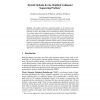Free Online Productivity Tools
i2Speak
i2Symbol
i2OCR
iTex2Img
iWeb2Print
iWeb2Shot
i2Type
iPdf2Split
iPdf2Merge
i2Bopomofo
i2Arabic
i2Style
i2Image
i2PDF
iLatex2Rtf
Sci2ools
125
click to vote
CPAIOR
2010
Springer
2010
Springer
Hybrid Methods for the Multileaf Collimator Sequencing Problem
Abstract. The multileaf collimator sequencing problem is an important component of the effective delivery of intensity modulated radiotherapy used in the treatment of cancer. The problem can be formulated as finding a decomposition of an integer matrix into a weighted sequence of binary matrices whose rows satisfy a consecutive ones property. In this paper we extend the state-of-the-art optimisation methods for this problem, which are based on constraint programming and decomposition. Specifically, we propose two alternative hybrid methods: one based on Lagrangian relaxation and the other on column generation. Empirical evaluation on both random and clinical problem instances shows that these approaches can out-perform the state-of-the-art by an order of magnitude in terms of time. Larger problem instances than those within the capability of other approaches can also be solved with the methods proposed.
Collimator Sequencing Problem | CPAIOR 2010 | Larger Problem Instances | Operations Research | Problem Instances |
Related Content
| Added | 02 Sep 2010 |
| Updated | 02 Sep 2010 |
| Type | Conference |
| Year | 2010 |
| Where | CPAIOR |
| Authors | Hadrien Cambazard, Eoin O'Mahony, Barry O'Sullivan |
Comments (0)

